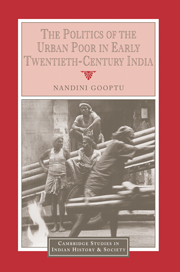Book contents
- Frontmatter
- Dedication
- Contents
- List of tables
- Acknowledgements
- List of abbreviations
- Select of glossary
- 1 The study and its perspectives
- Part I Changing contitions and experiences in interwar north India
- Part II Modes of political action and perception
- 5 Untouchable assertion
- 6 Militant Hinduism
- 7 Resurgent Islam
- 8 Nationalist action
- 9 Congress socialist mobilisation
- 10 The politics of exculsion and the ‘virtuous deprived’
- Bibliography
- Index
10 - The politics of exculsion and the ‘virtuous deprived’
from Part II - Modes of political action and perception
Published online by Cambridge University Press: 05 July 2014
- Frontmatter
- Dedication
- Contents
- List of tables
- Acknowledgements
- List of abbreviations
- Select of glossary
- 1 The study and its perspectives
- Part I Changing contitions and experiences in interwar north India
- Part II Modes of political action and perception
- 5 Untouchable assertion
- 6 Militant Hinduism
- 7 Resurgent Islam
- 8 Nationalist action
- 9 Congress socialist mobilisation
- 10 The politics of exculsion and the ‘virtuous deprived’
- Bibliography
- Index
Summary
The participation of the poor in caste, religious and nationalist politics and mass movements in late-colonial urban north India was fuelled by the intensification of class conflicts. The experience of exclusion and marginalisation, both discursive and material, that the urban poor faced in the interwar years exercised a defining influence on their politics and provided the motivating power. Social differences in the towns had become sharper and more pronounced between various groups of the poor, on the one hand, and the amorphous professional and commercial middle classes and the propertied, on the other. Insecure, impermanent and variable jobs and shelter, as well as poverty and indebtedness, of course, set the poor apart. While these potentially sowed the seeds of social contradiction, they did not in themselves contribute to class tensions. Social construction of the poor as dangerous and undesirable, and measures to discipline, segregate or improve them, served to crystallise class divisions and unleash social conflict. Local policy, policing, social and cultural reforminitiatives, and attempts at political control, emanating either from the colonial state or from the Indian middle classes, were all based on the increasing identification and isolation of the urban poor as a separate social class laden with negative characteristics. Moreover, in the case of the untouchable or the Muslim poor, their caste status and religious affiliation further reinforced their stigmatisation and social exclusion by the urban upper and middle classes, who were predominantly higher-caste Hindu, and included orthodox commercial groups as employers of labour and as zealous promoters of Hindu revitalisation movements.
- Type
- Chapter
- Information
- The Politics of the Urban Poor in Early Twentieth-Century India , pp. 420 - 430Publisher: Cambridge University PressPrint publication year: 2001



